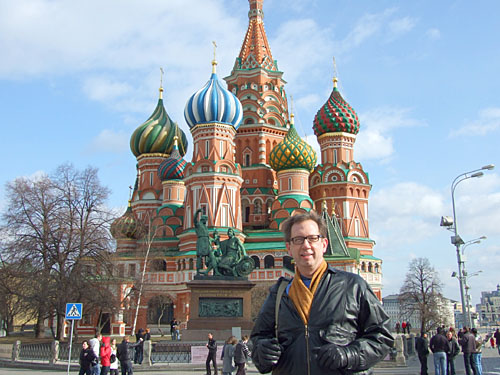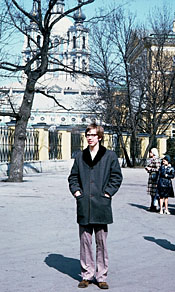 |
|
 After arriving at Moscow airport on April 19, 2009, I headed straight for Red Square and St. Basil's Cathedral after a 36-year absence. Return to Russia The High School Journey that Changed My Life By David J. Olson In April 1973, a 17-year-old senior from Montevideo Senior High School, along with three classmates, made the first overseas trip of his life to the Soviet Union at the height of the Cold War. It was a life-changing experience for the naive and impressionable farm boy, which eventually led to a career in international development and global health. Exactly 36 years later, in April 2009, he returned to the country now called Russia as a middle-aged man, and found it had changed profoundly. That person was me, and this is the story of my two trips to Russia, and how it changed in the 36 intervening years. I grew up on a farm 10 miles east of Montevideo, where I lived until my parents moved our family into town in December 1971. Although I had long been afflicted by wanderlust and a vivid imagination, even I had never entertained the idea of traveling to a place as exotic as the Soviet Union. My sights were more focused on Western Europe: I was envious of the travels of my high school English teacher, Claude Dziuk, who took a small group of MSHS students to Western Europe every summer. It was Mr. Dziuk who told me about a teacher friend of his in Pennsylvania who took high school students to the Soviet Union every spring for an Easter vacation trip. After pondering this briefly, I signed up and earned the $590 for the 10-day trip with my part-time job at Dairy Queen (that $590 bought me a round-trip airfare New York-Moscow, hotels, meals, tickets to the ballet and the circus, local transport and English-speaking guide!). My senior classmates Sue Berg (now Winters) Roselyn Nordaune and Debbie Prekker also went on the trip. The trip was magical. I remember checking in at the Intourist Hotel our first night in Moscow and immediately walking the few blocks to Red Square, the very heart of the Soviet Union. I was almost overwhelmed by its beauty, splendor and mystery. Red Square contains St. Basil's Cathedral, the most iconic and beguiling symbol of Russia, the walls and towers of the Kremlin and Lenin's Tomb, all spectacularly lit up. It was surely the most exotic thing I had ever seen in my life. However, my overall impression of Moscow was a bit different in the light of day - gloomy and possibly menacing. Gloomy because it was overcast and cloudy the entire time I was there, everyone wore black and nobody smiled. Menacing because we were there at a time of great tensions between the U.S. and the Soviet Union and we had been warned that we, as American high school students, might be watched by KGB agents. Naturally, as impressionable high school students from the Midwest, we were quite capable of believing that Soviet agents were stalking us, waiting for us to slip up and make one wrong move. One night I came back to my hotel to find a group of American men in suits drinking in the lobby on my floor. Hearing them speak English, I struck up a conversation with them and found out they were U.S. senators having discussions with the government of Soviet Premier Leonid Brezhnev. One of them was Sen. Howard Baker of Tennessee, who went on to become Senate majority leader, White House chief of staff and a presidential candidate in 1980. For the first time, I saw ballet and I can assure you that there is no better place than Russia to experience ballet for the first time - we saw both the Bolshoi Ballet in Moscow and the Kirov Ballet in Leningrad (now St. Petersburg). The star of the Kirov in 1973 was a young dancer named Mikhail Barishnikov. The following year, Barishnikov defected and went on to become the star of the New York City's American Ballet Theatre and one of the greatest ballet dancers of the 20th century. I came of age in the Soviet Union figuratively as well as literally: My birthday is April 22 (which is also Lenin's Birthday), and I turned 18 years old on the night train from Moscow to Leningrad drinking Russian sparkling wine. Here are a few other memories that I wrote to my parents in my only letter to them from the Soviet Union dated April 23, 1973: "For about eight cents, I can ride the Metro (or subway) for as long as I want. It goes to almost anywhere in the city." "When I was going into Lenin's Tomb you are not allowed to take in cameras and photograph his body. I had a box of bubble gum in my pocket and a soldier took it for a camera. He pulled me out of line and searched me. It was rather exciting." "The kids here are crazy about chewing gum. If they recognize you as a tourist they'll stop you and ask to trade them gum for these little Communist pins. I've got all kinds of these pins so far. They don't make any chewing gum in this country. I almost started a gum riot on Red Square. It's a long story; I'll tell you when I get home." The trip was filled with many experiences not normally acquired by a farm boy from southwestern Minnesota. After college at Minnesota State University at Moorhead, I joined the Peace Corps and served in West Africa. I went on to an international development career that took me to 65 countries in Africa, Europe, Asia and Latin America, and I have lived in Africa, Asia, South America and Europe. I always wanted to go back to Russia, but did not have the opportunity until this year, when I went there to give public relations training, facilitate PR planning and write stories for the non-profit organization I had worked for the last 17 years. I was thrilled to have the chance to return to the place of my first significant international experience and see how Russia had changed as a result of the dramatic and historic changes that followed the death of Brezhnev in 1982 and the rise of Mikhail Gorbachev. It is a vastly different Russia. Despite the recent chilling of relations between our countries, they no longer hate Americans. People smile a little more than I remember. Clothing is a little more colorful (but still mostly black). Most importantly, Russia has gone Madison Avenue: I do not remember seeing any neon lights or billboards along the roads in 1973. This time, I saw advertising everywhere. In Moscow and St. Petersburg, the two most important cities, McDonalds are ubiquitous, and most of them are open 24 hours a day. Nothing demonstrates the triumph of capitalism better than the fact that there is now a McDonald's a few meters from the main public entrance to the Kremlin grounds. And what's worse, there is a line of customers waiting for service that extends out of the door, something I've never seen anywhere else. When I expressed amazement over the proximity of this McDonald's to the Kremlin, my friend Michael Gorbachev exclaimed "You won [the Cold War]!" My response was "We didn't want to win this way!" I made this video which shows McDonalds at the Kremlin gates: http://www.tinyurl.com/lcz6tf I relived some of my 1973 experiences in 2009: For the second time, I celebrated a birthday in Russia, and this one was very special indeed: My friends took me to the Bolshoi Ballet (http://www.bolshoi.ru/en/), now in its 233rd season, to see "Sparatacus." I sat in the fifth row center and soaked up some of the greatest artistry in the world. That night, Michael Gorbachev and I got on the 11:30 train in Moscow and took the overnight train to St. Petersburg, where I once again went to the Mariinsky Theatre (http://www.mariinsky.ru/en), this time to see opera. These were all familiar, if distant, memories. A few days later, after I had returned to Moscow, I went back to see Red Square at night one more time on my last night in Russia. I wandered slowly around the square - there were few tourists there that late at night - and soaked up the splendor, beauty and mystery of Red Square once again (see my photos from that night here: http://tinyurl.com/mcfgqq). I thought back to that first visit to Red Square 36 years before and decided that it was still the most exotic thing I have ever seen in my life. I trust that will not change no matter how much the rest of Russia changes. When I said goodbye to my Russian colleagues the next day, I told them that this trip had made me realize that my first trip to Russia had changed my life forever. NOTE: David is the son of Jule and Val Olson, 1644 N. 4th St, Montevideo, a graduate of Montevideo Senior High School and now lives in the Washington, DC area. You can view his Moscow photo album on Facebook at http://tinyurl.com/lsuhkh |
|
Russia is the only country in this section where I didn't actually live. But Russia significantly changed the course of my life and led to my overseas career, as explained in this article I wrote for the Montevideo (Minnesota) American-News, my hometown newspaper, and published on Aug. 20, 2009.  ...and as a high school student in Russia on my first trip in 1973. |
